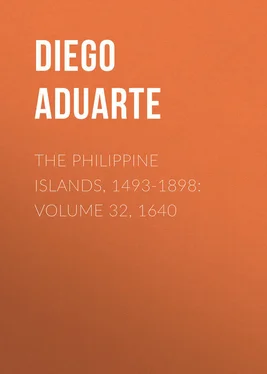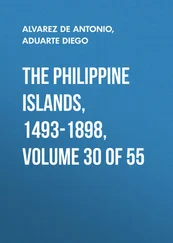Diego Aduarte - The Philippine Islands, 1493-1898 - Volume 32, 1640
Здесь есть возможность читать онлайн «Diego Aduarte - The Philippine Islands, 1493-1898 - Volume 32, 1640» — ознакомительный отрывок электронной книги совершенно бесплатно, а после прочтения отрывка купить полную версию. В некоторых случаях можно слушать аудио, скачать через торрент в формате fb2 и присутствует краткое содержание. Жанр: foreign_antique, foreign_prose, Историческая проза, на английском языке. Описание произведения, (предисловие) а так же отзывы посетителей доступны на портале библиотеки ЛибКат.
- Название:The Philippine Islands, 1493-1898: Volume 32, 1640
- Автор:
- Жанр:
- Год:неизвестен
- ISBN:нет данных
- Рейтинг книги:4 / 5. Голосов: 1
-
Избранное:Добавить в избранное
- Отзывы:
-
Ваша оценка:
- 80
- 1
- 2
- 3
- 4
- 5
The Philippine Islands, 1493-1898: Volume 32, 1640: краткое содержание, описание и аннотация
Предлагаем к чтению аннотацию, описание, краткое содержание или предисловие (зависит от того, что написал сам автор книги «The Philippine Islands, 1493-1898: Volume 32, 1640»). Если вы не нашли необходимую информацию о книге — напишите в комментариях, мы постараемся отыскать её.
The Philippine Islands, 1493-1898: Volume 32, 1640 — читать онлайн ознакомительный отрывок
Ниже представлен текст книги, разбитый по страницам. Система сохранения места последней прочитанной страницы, позволяет с удобством читать онлайн бесплатно книгу «The Philippine Islands, 1493-1898: Volume 32, 1640», без необходимости каждый раз заново искать на чём Вы остановились. Поставьте закладку, и сможете в любой момент перейти на страницу, на которой закончили чтение.
Интервал:
Закладка:
Chapter XI
The state of affairs in Japon after the martyrdom of the saints Fray Alonso Navarrete and Fray Hernando de Ayala
[After the martyrdom of these holy religious the Christians of Omura, ashamed of their weakness, desired to follow their example. Father Fray Thomas del Espiritu Sancto and father Fray Juan de Los Angeles, religious of our order, and father Fray Apolinario Franco, commissary of the Order of St. Francis, went to take spiritual charge of these Christians in Omura. Fathers Fray Apolinario and Fray Thomas were arrested, with their servants, and imprisoned. Father Fray Juan de Los Angeles was not found. The landlord of father Fray Alonso Navarrete in course of time won the crown of martyrdom by the boldness of his confession; and he and another Christian were carried to an islet, and secretly executed at midnight on the last day of September. The tono of Omura, in perplexity, went to the court of the emperor to confer with him in regard to the questions raised by the arrest of the two fathers. The Christian faith extended, and some remarkable conversions of persecutors took place. The holy fathers suffered in prison from the rigors of winter, having been deprived of their clothes, and having no bed or any protection against the cold; for the prison was made of wood, and did not protect them against the cold, wind, or snow. They suffered equal tortures from hunger, having but a small ration of boiled rice without other food – the Christians having been forbidden to assist them.]
Chapter XII
The building of the church of Los Sanctos Reyes in the Parian
As soon as the order entered these islands, it took upon itself the charge of evangelizing and teaching the Chinese who came to these islands, every year, in pursuit of their business and profit. They all lived in a sort of alcaicería, or market, called in this country a Parian; and here there were usually ten thousand Chinese, and at times as many as twenty thousand. Here they not only store their merchandise, which is very rich, but maintain all the trades required for a very well ordered and provided community. They were at that time all heathen, because up to that time as soon as any Chinaman was converted and baptized he was obliged to leave this idolatrous place and to go to live in another village, of baptized Chinese, which was near there. In this way the effort was made to separate the newly-baptized from the heathen, so that they might not follow the bad example of their heathen neighbors while their Christianity, being new, had not sufficient strength to resist this temptation and free themselves from the danger of this scandal. The town of the heathen was not forgotten on this account; for the religious went from the town of the Christian Chinese, called Binondoc, where they lived, to preach every Sunday to those who lived in the Parian. This course was followed up to the year 1617, when it was remarked, with reason, how advantageous it would be that preachers should be constantly in residence in this multitude of people. Thus by having more intercourse with them, and being in closer relations with them, they might reap a greater spiritual harvest among the Chinese, and the number of those who should be baptized, in both sickness and health, might be greatly increased. The father provincial conferred with the two estates, ecclesiastical and secular, receiving the approval of everyone. The usual licenses were obtained, and a small wooden church and convent were begun. Everything was done at the expense of the order, that it might not be necessary to ask anything from the heathen Chinese, for whose benefit and advantage the buildings were erected. The Lord straightway began to manifest that the work was very acceptable to Him, by showing marvelous favor to a Chinaman who was occupied as overseer of the building. A Spaniard, enraged because he had been bitten by a dog, asked the Chinaman “whose dog that was,” intending to avenge upon the owner the pain which the dog had caused him. The Chinaman answered that he did not know whose it was, and the angry Spaniard said: “It must be yours, because you do not tell me.” Drawing his sword he thrust it at his chest; but the Lord, who was pleased with the care which the Chinaman gave to the building of His poor temple, guided the sword so that it struck an ebony cross which the Chinaman wore under his clothes. The blow made a deep mark upon this cross, while the Chinaman was untouched – the Lord receiving the thrust upon His own cross that it might not harm His votary. The Chinaman recognized this as a very special mercy, and a great reward for his labor; and he and all those who knew of the fact praised the Lord, wonderful in His works.
The poor church was finished, and being the edifice of those vowed to poverty it lasted but a short time. The beams which served as columns and held up the building were not strong, and the soil was marshy and unstable; hence the beams were unable to carry the load of the tiling, but gave way, in such a manner as to threaten the downfall of the church. To prevent this, so that no one might be caught beneath, it was planned to take down the tiling; and while the church was being untiled, and there were nineteen persons on the roof, the building (which was already on the point of falling) broke open with this additional weight, and the whole roof came down – key-beams, ridge-pole, and tiles. Even some of the largest beams were broken into very small fragments; and many of those who were on the peak of the roof were caught and buried in the lumber and tiles, so that of some there was nothing to be seen except some part of their clothing. A great multitude of people ran to the noise. Most of them were heathen, and stood looking on with much alarm at the ruin which had been wrought; but they did not dare to show any kindness, or to disinter the poor workmen who had been overwhelmed. Hence the men remained for a long space of time covered in this way, all supposing that they were not only dead, but horribly mangled. However, this was not the case; for the Lord was desirous of teaching these heathen the omnipotence of His providence and the care that He takes of those who serve Him; and all were taken out, unconscious indeed, but uninjured and in health, without the slightest wound upon any one of them, although some very heavy key-beams had been broken to pieces. They soon came to themselves and gave thanks to Him who had so marvelously preserved them; while all those present, who were innumerable, both Christians and heathen, were astonished, and the heathen said aloud: “Great is the providence of the God of the Christians.” Thus the Lord drew from these His enemies the highest praises, and changed into honor to His name that which might have caused offense among these idolaters if these men had been killed while working on the house of God. It was believed that the fervent prayer of father Fray Bartholome Martynez aided much in bringing about this result; for the work was going on under his direction, and when he saw that a good account of it could not be given, if the Lord did not remedy this misfortune, he begged this grace of Him most affectionately. And this was not the only time when the Lord granted to his faithful and devout prayers very marvelous things, as will be narrated in due time.
A small portion of the land belonging to the convent was made ready to serve, as well as possible, for a tiny church for the few Christians who were there. The harvest reaped here by the religious, in this multitude of heathen and idolatrous people, was marvelous. They taught them constantly by day and night in the church, in the squares, in their houses, without losing an opportunity to do them good – though they labored beyond their strength, trusting in the Lord whose work they were doing. Marvelous results immediately followed, to the great service and honor of the Lord and the profit of souls. Of the many sick in the Parian, who before the residence of the fathers had all departed in their heathen state, now, since they have had these devoted fathers among them and have heard their teaching, practically none have died without being baptized. Such is the fruit of the fathers’ care in expounding the faith to them, explaining to them the great good and the spiritual benefit of baptism, and the eternal misery of those who have neglected it. Often even the heathen relatives and friends of the sick have persuaded them to be baptized; and they, like the persons of their own nation whom the fathers have appointed for that purpose, take great care to ascertain if there are any sick, and to inform the fathers, that the latter may visit them and teach them the way to heaven.
Читать дальшеИнтервал:
Закладка:
Похожие книги на «The Philippine Islands, 1493-1898: Volume 32, 1640»
Представляем Вашему вниманию похожие книги на «The Philippine Islands, 1493-1898: Volume 32, 1640» списком для выбора. Мы отобрали схожую по названию и смыслу литературу в надежде предоставить читателям больше вариантов отыскать новые, интересные, ещё непрочитанные произведения.
Обсуждение, отзывы о книге «The Philippine Islands, 1493-1898: Volume 32, 1640» и просто собственные мнения читателей. Оставьте ваши комментарии, напишите, что Вы думаете о произведении, его смысле или главных героях. Укажите что конкретно понравилось, а что нет, и почему Вы так считаете.












